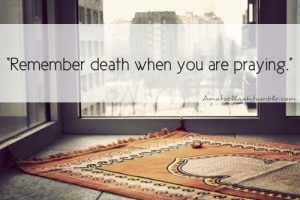This is your sister Danielle LoDuca again, and we’re continuing our reflections on the Names of Allah Almighty. We discussed the Name Al-Muhyi (the Giver of Life) and we’re discussing here His Name Al-Mumeet (The Taker of Life).
Allah tells us in the Quran: {He gives life and causes death and to Him you’ll be returned}
And He confirmed to us in chapter 29: {Every soul shall test death.}
We all know death is in fact a certainty, it is a reality; it is factually no escaping death. Your beautiful child jumping around, smiling and giggling, that child eventually will test death.
The famous people we see in the media, those people who looked to have perfect lives- rich and famous- will all pass away, they meet their end, they will die.
The best of mankind, the Prophets (peace upon them) had to experience death; they’d gone and passed away.
Still death is one of the most difficult topic to think about and give our tension to. In fact many people have a very strange relationship with death. You see for example the non-Muslim community, they make movies about death horrors and the entire movies are about people are trying to escape death, trying to survive and there is fear in gender of that and the fear is based on fearing death.
And on the other hand, we have people trying to avoid acknowledging death and they talk about health food and exercise and medicine as if somehow it’s going to stave of death and keep it at bay.
But no matter how we eat, no matter how much we exercise, no matter how much we go to the doctor, no matter how many cures they find, no matter how much medicine we take, how many actions we get, we will still die in the end.
But by understanding that Allah is the Taker of Life, it really changes one’s perspective and it enables us as Muslims to live in a truly productive way that is free of fear, that is proactive and geared toward being realistic acknowledging that there will be an end, and acknowledging that there is an end, we change how we live in our daily basis.
Have you ever experienced the death of someone close to you? I remember when my mother in law was ill and she was in her last days, at that time I had a hind awareness of my own faults, of my own shortcomings. And I was able to resolve to really improve those things, to realize the urgency. And even my mother in law was elderly, may God bless her and forgive her and grant her Jannah, my own mortality and the fact that I’m not guaranteed old age, I became more clear that I ever had been before.
As Muslims, we don’t look forward to death, we don’t wish for death, we ask Allah to have health and have long lives so that we can do more good in our lifetimes and we don’t live fear of death. But we live in the middle ground.
We allow the certainty of death to put our lives in true perspective, to set our priority straight, to remind us daily, even every hour, that we have to live this life to the best of our ability that we can’t take any minute, any moment, any hour, any day, any week, or year for granted and of course Allah has explained what to do: {Worship your Lord until it comes to you the certainty.} what is the certainty? The certainty is death.
So until death comes to us, what we’re supposed to be doing is worshiping Allah Al-Mumeet, the one who gave us life and the one who will one day take it away.
In order to do that to the best of our abilities, we have to have a connection with the Book of Allah, His guidance, the Quran and basically set our priorities straight.
 Are we wasting too much time? Are we engaged in things that if we were to die doing them do we be regretful?
Are we wasting too much time? Are we engaged in things that if we were to die doing them do we be regretful?
These are some of the things we should think about.
We should basically try to live our lives on a daily basis to the best of our abilities.
Doing things that we know that if we know we were to pass away doing them that we would not be regretful for it, we would be pleased of ourselves and we would have something to show for the time that we spent.
One of the most important things when we’re going to be questioned about is our prayers. Remembering death especially in our prayers, can help us maintain the Khushu’, that consciousness so that we can perform our prayers in the best way possible and this will help us to live our lives outside prayers in a more conscientious way, a way that is more aware of the fact that there is our Lord looking over us.
We want to have more to show for the days and hours that Allah has given us.
In addition to that, we want to think when we deal with our family and friends and our neighbors about how those relationships will reflect after our death as well.
So by remembering death, it’s actually very beneficial, it helps us to live better, more dignified, and righteous life.
So let’s make the du’a that Prophet Yusuf (peace be upon him) said in chapter 12: {cause me to die as Muslim, in submission to Allah, and join me with the righteous.} Ameen.
Thanks for listening.
Assalamu Alaykum wa Rahmatullahi wa Barakatuh.
